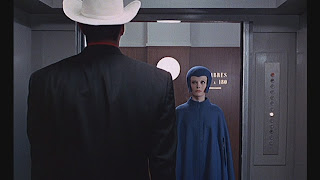Premiering at the end of a decade already rife with excessive political satires from (where else?) France, is Mr. Freedom, a film that seems more a byproduct of drugs (or just flat out insanity) than a social/critical agenda. Mr. Freedom (1969) could be described as Team America: World Police shot by Lloyd Kaufman, only Team America is actually satirical, and Kaufman better at narrative coherency. There are some aspects of this movie's narrative that seriously baffle me, which is sad, because the bear bones of its plot are seriously amazing.
The plot is as follows: Mr. Freedom (geared up in attire General Patton would be proud of), the legendary hero of Freedom Incorporated, is sent overseas to stop an impending communist takeover of France from both China and the Soviets. How the combination of a plot so dynamic and cinematography so outrageous could lead to an incredibly boring (and moronically preachy) film is really a marvel in itself. The film's pacing is strangely slow (perhaps due to uninteresting camera work), and Mr. Freedom's ignorant banter on minorities only seems to reinforce stereotypes rather than combat them (banter which occurs at moments set up to make us laugh, leading to various inconsistencies in the film's overall tone). Had Mr. Freedom's psuedo-political preaching been exchanged for punches, the film could have been something great. What I mean to say is, that if the director were smarter, he would have made his film more stupid (if that makes any sense at all).
But I wouldn't have spent all this time gathering stills had I thought this film was completely devoid of enjoyment. Certain aspects of Mr. Freedom (to be listed 1 to 3) do have cause for appreciation, and do set it apart from your typical low-budget farce.
Playing at piano is Serge Gainsbourg, who offered his (at the time) star appeal to the film (and really nothing else worth noting).
1.) Set Design - Perhaps the film's unusual pacing has to do with an incongruent use of the film's budget. Certain scenes feel absolutely alive and colorful, displaying a great deal of creativity and imagination, while others are nauseatingly dull. The film often drudges through overly long scenarios, only to surprise us with settings that can be absolutely hilarious in their visual style alone. This moment in particular echoes the infamous rainbow room in Jodorowsky's Holy Mountain, and uses surrealism to generate genuinely intriguing results (although I really have no idea what's happening here...).
2.) Insanity - Despite a tendency of being totally stupid in its political dealings, when this movie decides to go crazy it goes absolutely wild. John Abbey (Mr. Freedom) is a giant of a man, and acts precisely on the border of militant fascist and cartoonish lunatic. Seen above, he neutralizes a group of Frenchmen(?) with his hypnotic glasses. Abbey delivers his lines with an unabashed ferocity, highlighting the tensions between antiquated "good old American values" and ideological intolerance. Not that any of his lines are intelligent, and Klein's framing of Americans as strictly adhering to a 50's mentality comes off as misguided - considering that this film was a direct response towards America's involvement in Vietnam.
Above: Mr. Freedom knocks himself out by backing into a sign-post, then reappears in front of the inflatable Red Chinaman, the Soviet commander (whose name I never caught), and a recent apparition of Jesus and Mary. I didn't attempt making sense of it all.
3.) Tactility - Above all else, Mr. Freedom feels like a movie made by people - not by a studio, or by producers, or (although impossible at the time) computers, but by everyday people who could get in on the action just by throwing on a pitcher's helmet and some face paint. There are many occurrences of foregrounded characters dancing uncontrollably for no discernible purpose. Moments like these, where actors are free to act out unscrupulously, seem to appear mostly in either experimental or trash cinema - two outlets that may have opposing agendas, but share a spot outside the mainstream. Sometimes, watching bodies move freely is exciting in itself, whether it be in the party-like kineticism of Troma films (Terror Firmer, for instance), or in films such as Man With A Movie Camera, which illuminate the beauty of physical forms in motion. Mr. Freedom chooses to look fairly ugly, but there's something I can appreciate about that.
















































No comments:
Post a Comment